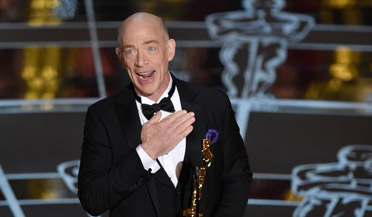They Shoot Oscar Prognosticators, Don’t They?
Birdman Triumphs at Politicized Oscars
By J. Don Birnam
February 23, 2015
BoxOfficeProphets.com

Alejandro González Iñárritu joined a select group of individuals who have won three Oscars for the same movie when his movie won screenplay, upsetting Wes Anderson in The Grand Budapest Hotel. This group includes The Coen Brothers, Woody Allen, and James Cameron, among others. In the end, the consensus picks triumphed almost everywhere, as the Oscars remained predictable as ever. Boyhood’s loss seems both brutal and predictable. Meanwhile, The Grand Budapest Hotel tied Birdman’s four Oscar wins, and Whiplash didn’t do so poorly itself, netting three Oscars.
Most of the other categories went to the consensus picks. I guess the biggest surprise to me was Big Hero 6’s defeat of How to Train Your Dragon 2. It makes some sense - after The LEGO Movie snub, people just assumed that Dragon would take it, but Big Hero 6 is such an amazing movie, it’s not hard to see why it won. Birdman’s defeat of Budapest in the Original Screenplay race also makes some sense - they like to shore up their Best Picture pics by giving it more Oscars. It’s a shame that had to come at the expense of Wes Anderson, whose picture won four technical Oscars but not any of the main ones. These include Score, Make-up, Costumes, and Production Design.
Whiplash won Editing and Sound Mixing - as I can say I proudly predicted weeks ago before it became the consensus pick - to shore up its deserving win for Best Supporting Actor. Selma took home Best Original Song, American Sniper won Best Sound Editing, The Imitation Game won Best Adapted Screenplay, and The Theory of Everything and Boyhood took home acting prizes. So they spread the wealth as most expected. Alexandre Desplat finally has an Oscar, after winning for the score of The Grand Budapest Hotel, and so does Julianne Moore. Those were my highlights of the night.
The big story has to be that the speeches this year were more political than usual. Patricia Arquette began it by calling for equal pay for women, which led to standing ovations from Meryl Streep and Jennifer Lopez in a strange but touching moment. Common spoke about incarceration rates and discrimination against African-Americans when he accepted the Oscar for “Glory,” and the screenwriter for the Imitation Game spoke of the difficulties of growing up as a gay individual. Julianne Moore spoke of Alzheimer’s, and Eddie Redmayne spoke of ALS disease. And, not surprisingly, Laura Poitras spoke about government spying when she took the stage to accept the Oscar for CITIZENFOUR.
It’s somewhat ironic that in a year when Hollywood decided to award a movie about itself again - the third time this has happened in the last four years - many winners would choose to make speeches about socially relevant topics. It’s also somewhat ironic that in a year when it’s likely that many conservatives tuned in to see American Sniper win (and then saw it walk away with a lowly Best Sound Editing Oscar) that they were treated to the most liberal Oscars telecast in a long while.
On one hand, it’s nice to hear speeches that are not just a long litany of thank yous. On the other hand, one does wonder how much the people giving these speeches actually care about these issues. I don’t doubt the legitimacy of Common’s commitment to civil rights, for example. But when Harvey Weinstein says that he would give up his British honors so that gay men who were persecuted under Britain’s old anti-homosexuality laws are given pardons, one does wonder if he means it or if he’s campaigning.
As for the host, the consensus amongst my friends was that Neil Patrick Harris fell somewhat flat. As you know, I don’t watch the Oscars for that, as I care about the awards, so I don’t really have an opinion and will leave to others to analyze the content of the show outside the awards.
We now put the season to bed, and the two questions to ponder are: what happened to Boyhood, and why have the Oscars become so predictable? I’ll leave the second for one last column about 2014. As for the first - one does wonder. Did Boyhood peak too soon? Did it collapse under the weight of its own expectations? I liked both movies a lot and was sad that Linklater could not walk home a winner. The project was ambitious and successful. It’s difficult to believe, even now, that a movie as strange as Birdman won Best Picture. It sticks out as something completely different.
In the end, however, Boyhood was saved in a way. In the future, it will not have to live up to that impossible standard, that ever-present gloss that comes with being labeled a “Best Picture.” Like other masterpieces before it, Boyhood will live on without that Oscar. Birdman, now, will have to stand that test of time. It is a great movie, but I suspect it will also be dismissed by many as another example of the industry congratulating itself.
Nevertheless, Boyhood’s poor showing last night is disappointing to me and the other people who liked the movie. It is hard to see this as a weak year, when so many deserving movies were available for praise and were recognized by the Academy. It’s really hard to argue with a lot of the picks - Sniper deserved the Sound Oscar as much as Selma deserved the Song one. Whiplash truly deserved its wins. Boyhood, perhaps, could have used a bit more love, but there are only so many categories.
I’ll put a final bow on the season with one final column soon, and then we can move on with our lives.